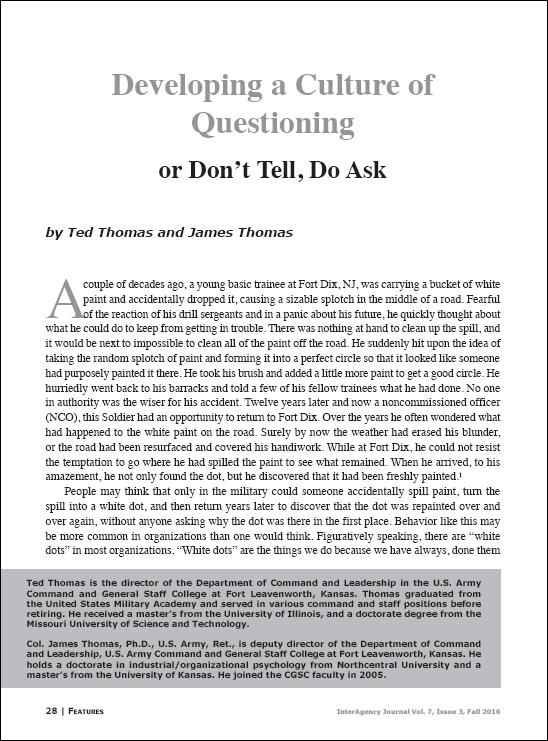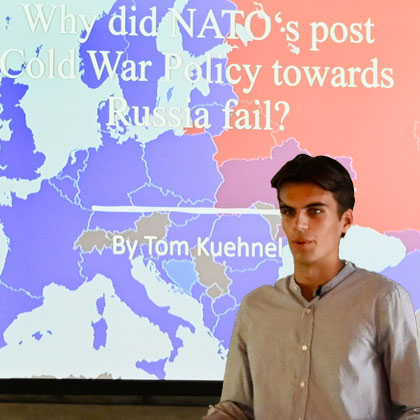Featured Article: Developing a Culture of Questioning
Featured article:
Developing a Culture of Questioning or Don’t Tell, Do Ask
by Ted Thomas and James Thomas
A couple of decades ago, a young basic trainee at Fort Dix, NJ, was carrying a bucket of white paint and accidentally dropped it, causing a sizable splotch in the middle of a road. Fearful of the reaction of his drill sergeants and in a panic about his future, he quickly thought about what he could do to keep from getting in trouble. There was nothing at hand to clean up the spill, and it would be next to impossible to clean all of the paint off the road. He suddenly hit upon the idea of taking the random splotch of paint and forming it into a perfect circle so that it looked like someone had purposely painted it there. He took his brush and added a little more paint to get a good circle. He hurriedly went back to his barracks and told a few of his fellow trainees what he had done. No one in authority was the wiser for his accident. Twelve years later and now a noncommissioned officer (NCO), this Soldier had an opportunity to return to Fort Dix. Over the years he often wondered what had happened to the white paint on the road. Surely by now the weather had erased his blunder, or the road had been resurfaced and covered his handiwork. While at Fort Dix, he could not resist the temptation to go where he had spilled the paint to see what remained. When he arrived, to his amazement, he not only found the dot, but he discovered that it had been freshly painted.
People may think that only in the military could someone accidentally spill paint, turn the spill into a white dot, and then return years later to discover that the dot was repainted over and over again, without anyone asking why the dot was there in the first place. Behavior like this may be more common in organizations than one would think. Figuratively speaking, there are “white dots” in most organizations. “White dots” are the things we do because we have always, done them that way and never questioned why.
Read the full article
Developing a Culture of Questioning or Don’t Tell, Do Ask PDF
Download the complete edition
Ted Thomas is the director of the Department of Command and Leadership in the U.S. Army Command and General Staff College at Fort Leavenworth, Kansas. Thomas graduated from the United States Military Academy and served in various command and staff positions before retiring. He received a master’s from the University of Illinois, and a doctorate degree from the Missouri University of Science and Technology. Col. James Thomas, Ph.D., U.S. Army, Ret., is deputy director of the Department of Command and Leadership, U.S. Army Command and General Staff College at Fort Leavenworth, Kansas. He holds a doctorate in industrial/organizational psychology from Northcentral University and a master’s from the University of Kansas. He joined the CGSC faculty in 2005.

Posted: December 27, 2016 by Simons Center
READ THE LATEST UPDATES FROM THE SIMONS CENTER
"*" indicates required fields


